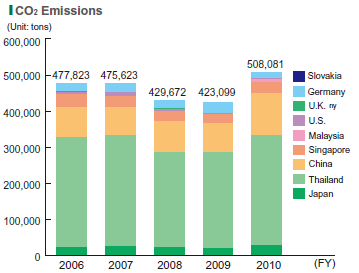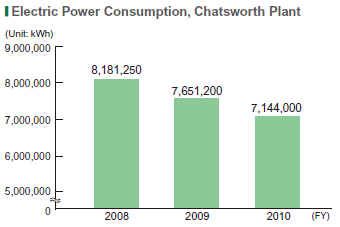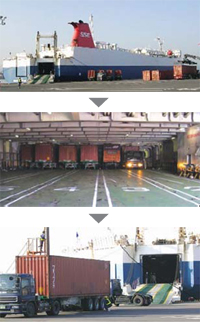Initiatives for Preventing Global Warming Back Number (2011)
Back to Latest Initiatives for Preventing Global Warming
Basic Approach
All of the Minebea Group's economic activities and dealings with society, including its business activities, are possible only with the stability and prosperity of the planet on which we live. In recent years, with respect to what is acknowledged to be a planetary-scale problem, global warming, the Minebea Group assumes that such consequences as increased energy costs and anomalous climatic phenomena will be the cause of a major impact on the conduct of its business activities.
Since the establishment of the Minebea Environmental Charter in 1993, the Minebea Group believes that it must deal with global warming, and has actively promoted energy conservation measures, and these measures are showing results. However, our production facilities and places of business have already implemented representative measures, and to promote further improvements going forward, we believe that more knowledge, specific successful examples, and plans must be shared across business unit boundaries.
In January 2010, the Minebea Group established its Energy Conservation Promotion Committee to take its company-wide activities relating to energy conservation and global warming-related measures to the next level. The Committee is staffed by members selected from all business divisions, and is undertaking to strengthen its initiatives to prevent global warming by sharing useful knowledge, technology and energy-conservation measures across divisional boundaries.
Results of FY2010 Initiatives
 The Minebea Group's emissions of CO2 in FY2010 totaled 508,081 tons, approximately 20% more than in FY2009. The increase reflects the Minebea Group's business recovery and increased utilization rates at its plants and production facilities worldwide, as well as the addition of new plants to our CO2 emissions recordkeeping.
The Minebea Group's emissions of CO2 in FY2010 totaled 508,081 tons, approximately 20% more than in FY2009. The increase reflects the Minebea Group's business recovery and increased utilization rates at its plants and production facilities worldwide, as well as the addition of new plants to our CO2 emissions recordkeeping.
In addition, the Great East Japan Earthquake, which occurred on March 11, 2011 resulted in continuing major electric power shortages, principally in areas served by Tokyo Electric Power Company and Tohoku Electric Power Company, and in the area centered on Tokyo and adjacent prefectures, planned electric power outages were carried out. The Minebea Group responded to these measures in a variety of ways, such as switching production from day to night at its Fujisawa and Matsuida Plants.
We will continue to cooperate with efforts to reduce electric power consumption within Japan.
Production Facility Initiatives
Localized Air Conditioning for Foundry (Rojana Plant)


Working areas and passageways in the Rojana Plant are more effectively cooled by partitioning them off from the rest of the plant with panels
Many large-scale, high-temperature facilities are located in foundries, such as aluminum smelters and casting furnaces, and the operation of these facilities results in very high overall plant temperatures. As a result, situating air conditioners throughout the plant and running them at full capacity still did not result in sufficient cooling within the plant.
In March 2010, the Rojana Plant, which is the Minebea Group's principal smelting facility in Thailand, installed panels within the plant to partition employee work areas and passageways off from high-temperature areas of the plant. Air conditioning is concentrated in the partitioned areas. This approach resulted in a more comfortable working environment and contributed to energy conservation by dramatically reducing the volume of space to be cooled.
Promoting Energy Conservation with Intermittent Hydraulic Pump Operation (Machine Maintenance Dept., Energy Conservation Promotion Committee)
Oil pressure provides motive power for much of the machinery used by the Minebea Group. This pressure is typically maintained by constant operation of hydraulic pumps. When driving a particular machine, a switching or magnetic valve is opened, and hydraulic fluid is sent to a cylinder to power the machine's drive shaft.
As part of the activities of the Minebea Group's Energy Conservation Promotion Committee, the Machine Maintenance Dept. attached an accumulator to a hydraulic unit, allowing the pump to be operated intermittently. The results indicated that this approach could deliver a 30% reduction in the amount of electricity required to operate the equipment.
Going forward, the Energy Conservation Promotion Committee will recommend that business units adopt this approach and introduce intermittent hydraulic pump operation.

Preventing Global Warming through Accumulated Energy-efficiency Promotion (Chatsworth Plant)
 New Hampshire Ball Bearings, Inc. (NHBB) manufactures ball bearings for the U.S. market, from component processing to assembly. The accumulated impact of energy-efficiency promotion at NHBB's Chatsworth Plant is helping to prevent global warming.
New Hampshire Ball Bearings, Inc. (NHBB) manufactures ball bearings for the U.S. market, from component processing to assembly. The accumulated impact of energy-efficiency promotion at NHBB's Chatsworth Plant is helping to prevent global warming.
Compared to FY2008, when the Chatsworth Plant consumed 8,181,250kWh of electric power, in FY2010 consumption amounted to 7,144,000kWh, a reduction of approximately 13%. Following are just a few of the energy-conservation promotion measures adopted by the plant.
- Improvement of lighting equipment for offices and manufacturing areas
- Sensor-controlled lighting in restrooms and corridors
- Enhanced efficiency through installation of inverters for mist collectors and exhaust fans
- Reduced lighting in corridors and other sunlit indoor areas
- Upgraded control system for building air conditioning system
- Installation of control device enabling intermittent control of air conditioning compressor (Aircosaver*)
* Aircosaver: a device to control unnecessary cooling of air conditioner evaporator coils by syncing the device with the air conditioner compressor and switching it off when the evaporator coil is thoroughly cooled.
Initiatives at Offices
Making Room Temperature Visible with Temperature Readouts (Hamamatsu Plant)

Temperature readouts were placed in each office of the Hamamatsu Plant
The Minebea Group believes that efforts to avoid overcooling its offices in summer and overheating them in winter are an important initiative to conserve energy in offices and help prevent global warming. To eliminate individual differences in perceived temperature and ensure that everyone manages room temperature to the same standard, everyone must be able to see what the temperature is. Large temperature readouts have been placed in all offices at the Hamamatsu Plant to make the temperature visible. Even in offices having older air conditioners without precise temperature control, the room temperature is clear, which also makes clear the standard for operating such air conditioners manually.
Establishing One Day Each Month with Fixed Quitting Time (Japan)
In support of the Japanese Ministry of the Environment's recommended policy, the Minebea Group had already been requiring employees at all domestic plants and places of business to leave work at a fixed time on "CO2 Reduction/Lights Down Campaign" days in June and July, and has undertaken to raise employee awareness concerning the problem of global warming.
However, from the perspective that initiatives with respect to the problem of global warming should fundamentally be regular and continuous rather than temporary, beginning in August 2010, the third Wednesday of each month has been designated as a fixed quitting time day. At the outset of this initiative, the general manager of the Personnel & General Affairs Department and the Officer in Charge of Environmental Management jointly issued the notification below to employees.
As a new company-wide initiative, the third Wednesday of each month will be designated as a fixed quitting-time day. On this day, not only lights but all electric office appliances should be turned off to the extent possible after the designated time.
Since then, on the third Wednesday of every month, employees at all domestic plants and places of business have been promptly turning off office lighting and air conditioning and leaving the premises at the designated time.
Initiatives Related to Logistics and Transport
Modal Shift Initiatives

Shipping containers are directly loaded and
unloaded in Shanghai
Minebea uses high-speed ferries between Shanghai and Hakata to export and import products, machinery and equipment, materials and other goods between China and Japan, and uses Japan Railway freight trains and domestic vessels between Hakata and Tokyo. This transportation strategy greatly reduces lead times compared to using conventional freight vessels between Shanghai and Tokyo. It also substantially reduces energy consumption (CO2 emissions) relative to air transportation.
High-speed RORO* ferries can load and unload containers using trucks instead of large harbor cranes. This contributes substantially to lead time reduction while saving energy.
* Roll-on & roll-off (RORO) vessel; High-speed ferry capable of rapidly loading and unloading truck containers without using large harbor cranes.
Future Issues and Goals
In its fourth assessment report, the Intergovernmental Panel on Climate Change (IPCC) posits a best-case stabilization scenario of CO2 emissions in 2050 at levels ranging from 50% to 85% lower than those in 2000.
In response, the Minebea Group will take into account trends and other factors in each country and enterprise in establishing its Medium-term CO2 Reduction Target Value within this fiscal year.














